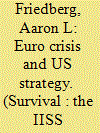| Srl | Item |
| 1 |
ID:
116641


|
|
|
|
|
| Publication |
2012.
|
| Summary/Abstract |
For 45 years after the end of the Second World War, American strategists worried far more about Europe's perceived political, economic and military weakness than they did about its potential strength. Following the fall of the Berlin Wall and the end of the Cold War this pattern was briefly reversed. With the signing of the Treaty of Maastricht in 1992 the birth of a 'United States of Europe' seemed finally to be at hand. Possessed of a vast market and nascent institutions of central governance, this new entity was widely seen as having the potential to become a major player on the world stage.
|
|
|
|
|
|
|
|
|
|
|
|
|
|
|
|
| 2 |
ID:
117479


|
|
|
|
|
| Publication |
2012.
|
| Summary/Abstract |
This article examines the recent expansion of large-scale rubber plantations in border areas of Laos and argues that this phenomenon as well as the attendant land concession controversy must be understood from the perspective of resource frontiers. While transnational Vietnamese investment in rubber plantations represents one form of land capitalisation, their establishment in southern Laos has been part of the turbulent political economic transition in Laos. Collaboration between frontier states which often bypasses central governance, chaotic boundaries between what is recognised as 'used or productive' and 'unused or underproductive resources', and regulatory disorientation of resource control allow what I call 'frontier capitalism' to proliferate.
|
|
|
|
|
|
|
|
|
|
|
|
|
|
|
|
| 3 |
ID:
193772


|
|
|
|
|
| Summary/Abstract |
China has undergone significant deviations from the command economy established in 1949, achieving unprecedented success in sustaining high growth. Consequently, numerous scholars have devoted their attention to studying China's economic development. In this study, we contribute to this literature using a new technique to examine China's economic development. This technique utilizes nonparametric directional distance function in the framework of neoclassical growth theory. It avoids the assumptions imposed on parametric production functions that are often short of practical justifications. Our analysis shows that capital and energy inputs account for 75.7% and 20.8% of China's GDP growth during 1985–2020. These figures characterize a capital-driven growth model that is unlikely to be sustainable by conventional wisdom. However, our empirical evidence, obtained through an interactive-fixed effects model, indicates that it is not unreasonable to say that growth in China is government-led rather than capital-driven; the former could be sustained by desirable reforms under strong national leadership while the latter is not.
|
|
|
|
|
|
|
|
|
|
|
|
|
|
|
|